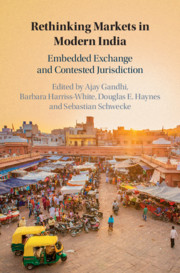Book contents
- Rethinking Markets in Modern India
- Rethinking Markets in Modern India
- Copyright page
- Contents
- Figures
- Tables
- Contributors
- 1 Markets in Modern India: Embedded, Contested, Pliable
- 2 Banking in the Bazaar: The Nattukottai Chettiars
- 3 Space in Motion: An Uneven Narrative of Urban Private Property in Bombay
- 4 Magic of Business: Occult Forces in the Bazaar Economy
- 5 Vernacular Capitalism, Advertising, and the Bazaar in Early Twentieth-Century Western India
- 6 The Artifice of Trust: Reputational and Procedural Registers of Trust in North Indian “Informal” Finance
- 7 Mandi Acts and Market Lore: Regulatory Life in India’s Agricultural Markets
- 8 The Market and the Sovereign: Politics, Performance, and Impasses of Cross-LOC Trade
- 9 Brandism vs. Bazaarism: Mediating Divinity in Banaras
- 10 Black Money in India: Fighting Specters and Fostering Relations
- 11 Market Making in Punjab Lotteries: Regulation and Mutual Dependence
- 12 Liquid Assets: Transactional Grammars of Alcohol in Jharkhand
- 13 Building on Sand? Criminal Markets and Politics in Tamil Nadu
- Index
- References
7 - Mandi Acts and Market Lore: Regulatory Life in India’s Agricultural Markets
Published online by Cambridge University Press: 24 September 2020
- Rethinking Markets in Modern India
- Rethinking Markets in Modern India
- Copyright page
- Contents
- Figures
- Tables
- Contributors
- 1 Markets in Modern India: Embedded, Contested, Pliable
- 2 Banking in the Bazaar: The Nattukottai Chettiars
- 3 Space in Motion: An Uneven Narrative of Urban Private Property in Bombay
- 4 Magic of Business: Occult Forces in the Bazaar Economy
- 5 Vernacular Capitalism, Advertising, and the Bazaar in Early Twentieth-Century Western India
- 6 The Artifice of Trust: Reputational and Procedural Registers of Trust in North Indian “Informal” Finance
- 7 Mandi Acts and Market Lore: Regulatory Life in India’s Agricultural Markets
- 8 The Market and the Sovereign: Politics, Performance, and Impasses of Cross-LOC Trade
- 9 Brandism vs. Bazaarism: Mediating Divinity in Banaras
- 10 Black Money in India: Fighting Specters and Fostering Relations
- 11 Market Making in Punjab Lotteries: Regulation and Mutual Dependence
- 12 Liquid Assets: Transactional Grammars of Alcohol in Jharkhand
- 13 Building on Sand? Criminal Markets and Politics in Tamil Nadu
- Index
- References
Summary
The “APMC Act” remains among the most widely commented upon and most deeply misunderstood laws governing Indian economic life. APMCs - Agricultural Produce Marketing Committees, more commonly known as mandis - are notified, physical primary markets designated as the main and, in some cases, the only state-sanctioned sites for the regulation of the critical “first transaction” between the primary producer and the buyer of his or her agricultural produce. The APMC is not the regulated market itself, but the local body constituted to oversee its regulation, and this is only one of many conceptual and practical confusions generated under the diverse state-specific agricultural marketing acts, which have been implemented with even greater diversity across varied agro-ecological, political-economic, and administrative contexts. Drawing on long-term archival and ethnographic research in a mandi and market town in the central Indian state of Madhya Pradesh, this chapter sketches out the regulatory biography of an agricultural market, the diverse narratives and experiences of legislative amendment and yard-level market “reform,” and illustrates the empirical and analytical purchase of embedded exchange and contested jurisdiction of markets on the ground.
Keywords
- Type
- Chapter
- Information
- Rethinking Markets in Modern IndiaEmbedded Exchange and Contested Jurisdiction, pp. 179 - 205Publisher: Cambridge University PressPrint publication year: 2020
References
- 2
- Cited by



